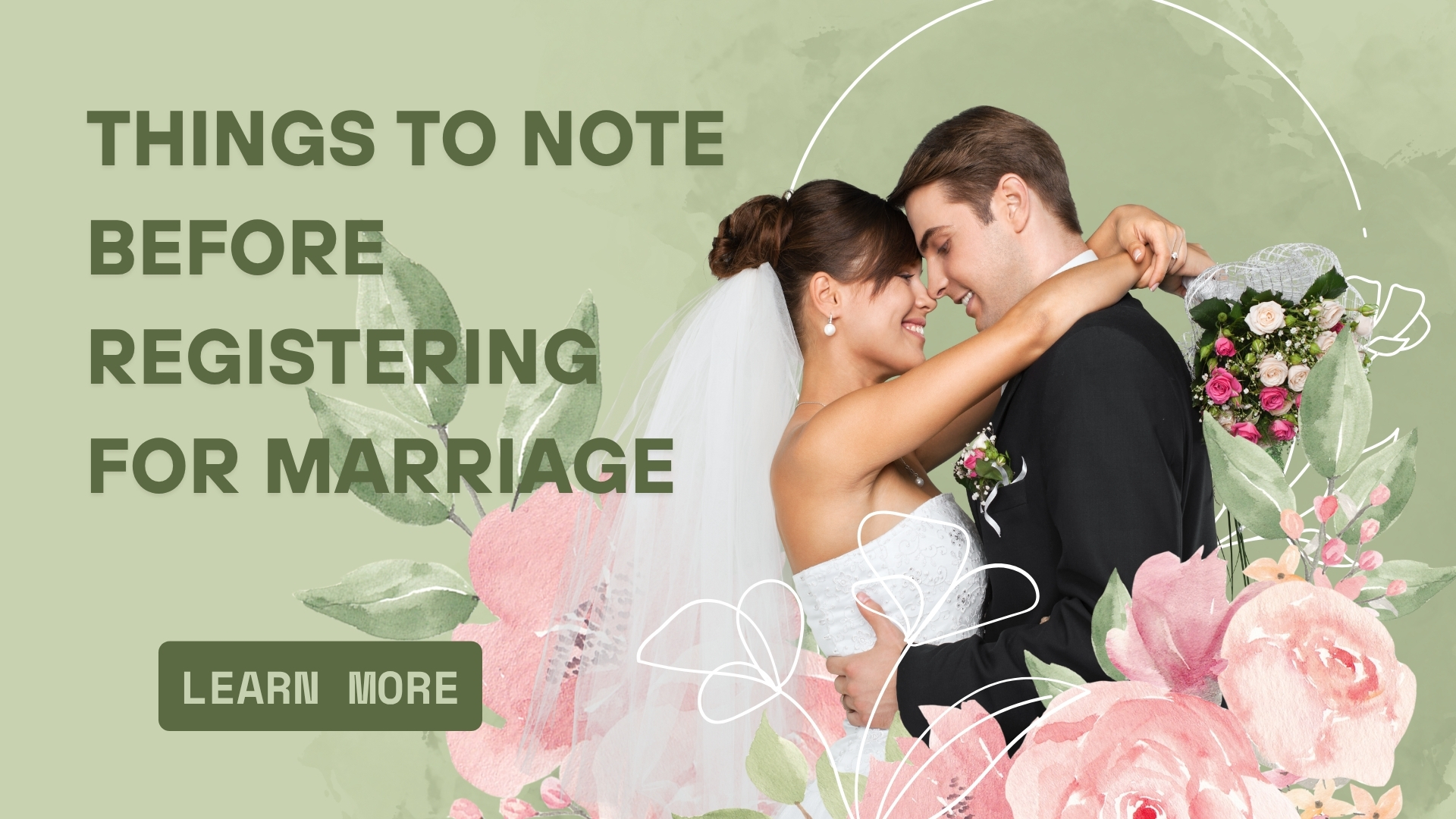Marriage is a significant milestone in anyone’s life, symbolizing the union of two individuals and, often, two families. While the wedding ceremony itself is filled with joy and celebration, the legal process of registering your marriage is equally important. Without proper registration, your marriage may not be recognized by law, leading to complications in the future regarding property rights, inheritance, and even immigration matters.
Before you embark on this journey, it’s crucial to be well-prepared. Understanding the things to note before registering for marriage will not only help you avoid unnecessary stress but also ensure that your marriage is legally valid and recognized. This comprehensive guide will walk you through all the essential aspects, from legal requirements and documentation to practical tips and frequently asked questions. Whether you’re planning a simple civil registration or a grand wedding followed by legal formalities, this article is your go-to resource for a smooth and hassle-free marriage registration process.
Understanding Marriage Registration

What is Marriage Registration?
Marriage registration is the official process of recording a marriage with the relevant government authority. This process legally recognizes the union and provides a marriage certificate, which serves as proof of marriage.
Why is Marriage Registration Important?
- Legal Recognition: A registered marriage is recognized by law, granting both partners legal rights and responsibilities.
- Proof of Relationship: The marriage certificate is essential for visa applications, joint bank accounts, and other legal matters.
- Protection of Rights: Registration safeguards the rights of both spouses in case of disputes, divorce, or inheritance claims.
Key Things to Note Before Registering for Marriage
1. Legal Age and Eligibility
Minimum Age Requirement
- For Males: Usually 21 years or older
- For Females: Usually 18 years or older
Note: The legal age may vary depending on your country or state. Always check local laws.
Marital Status
- Both parties must be unmarried at the time of registration.
- If previously married, proof of divorce or death certificate of the former spouse is required.
Prohibited Relationships
- Marriages between close blood relatives may be prohibited unless allowed by custom or law.
2. Types of Marriage Registration
Civil Marriage
- Conducted at a government office or registry.
- Suitable for couples of different religions or nationalities.
Religious Marriage
- Conducted according to religious customs.
- May require additional civil registration for legal recognition.
Special Marriage Act (in some countries)
- Allows interfaith or inter-caste marriages without religious conversion.
3. Required Documents
Common Documents Needed
- Proof of Age: Birth certificate, passport, or school leaving certificate.
- Identity Proof: National ID, passport, or driver’s license.
- Address Proof: Utility bill, rental agreement, or bank statement.
- Photographs: Passport-sized photos of both parties.
- Witnesses: Usually two or three adults with valid ID.
Additional Documents (if applicable)
- Divorce decree (if previously married and divorced)
- Death certificate (if widowed)
- Parental consent (if under the legal age in some jurisdictions)
- No Objection Certificate (for foreign nationals)
4. Notice Period and Application Process
- Notice of Intended Marriage: Some jurisdictions require you to give notice before the marriage date (e.g., 30 days).
- Application Submission: Submit the application form along with required documents at the marriage registrar’s office.
- Verification: Authorities may verify the documents and details provided.
- Marriage Ceremony: Some offices require a simple ceremony or declaration in front of witnesses.
- Issuance of Certificate: After successful registration, a marriage certificate is issued.
5. Fees and Charges
- Registration fees vary by location and type of marriage.
- Additional charges may apply for urgent processing or extra copies of the certificate.
6. Witnesses
- Most jurisdictions require at least two adult witnesses.
- Witnesses must provide valid identification and be present during the registration.
7. Marriage Registration for Foreign Nationals
- Additional documentation may be required, such as a single status certificate or a no objection certificate from the respective embassy.
- Translation of documents may be necessary if not in the local language.
8. Special Considerations
Interfaith or Intercaste Marriages
- May require additional formalities or documentation.
- Some countries have special laws to facilitate such marriages.
Same-Sex Marriages
- Not recognized in all countries. Check local laws for eligibility and process.
Marriages Abroad
- If marrying in a foreign country, check the legal requirements of both countries.
- Registration in your home country may be required for legal recognition.
Comparison Table: Civil vs. Religious Marriage Registration
| Feature | Civil Marriage Registration | Religious Marriage Registration |
|---|---|---|
| Legal Recognition | Yes | Sometimes (may need civil) |
| Interfaith Allowed | Yes | Varies by religion |
| Required Documents | Standard | May include religious docs |
| Witnesses Needed | Yes | Yes |
| Ceremony Type | Simple/Official | Religious/Customary |
| Registration Location | Registrar’s Office | Place of Worship/Registrar |
| Certificate Issued | Yes | Sometimes |
Practical Tips for a Smooth Marriage Registration
- Start Early: Gather documents and understand the process well in advance.
- Double-Check Requirements: Laws and requirements can vary by region.
- Book Appointments: Some offices require prior appointments for registration.
- Prepare Witnesses: Inform your witnesses about the date, time, and documents needed.
- Keep Extra Copies: Make photocopies of all documents for your records.
- Dress Appropriately: Some registrars may require formal or modest attire.
- Check for Holidays: Registrar offices may be closed on public holidays.
FAQ
What happens if I don’t register my marriage?
If your marriage is not registered, it may not be legally recognized, which can affect your rights related to property, inheritance, and spousal benefits.
Can I register my marriage online?
Some jurisdictions offer online application facilities, but physical presence is usually required for verification and the actual registration.
How long does the marriage registration process take?
The process can take from a few days to several weeks, depending on the notice period and verification procedures.
Is a religious marriage certificate enough?
In many countries, a religious marriage certificate alone is not sufficient for legal recognition. Civil registration is usually required.
Can foreigners register their marriage in my country?
Yes, but additional documentation and embassy verification may be needed.
What if my documents are not in the local language?
Certified translations may be required for all documents not in the official language of the country.
How many witnesses are required?
Typically, two to three adult witnesses are needed, but this can vary by jurisdiction.
Conclusion
Registering your marriage is a crucial step that ensures your union is legally recognized and protected. By understanding the things to note before registering for marriage—such as eligibility, required documents, types of registration, and special considerations—you can navigate the process smoothly and avoid unnecessary delays or complications.
Remember to start early, gather all necessary documents, and consult your local marriage registrar or legal expert if you have unique circumstances, such as interfaith marriages or foreign nationals. Marriage registration is not just a formality; it’s a foundation for your future together, providing legal security and peace of mind.
